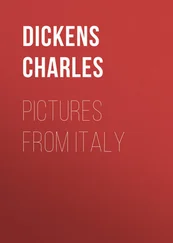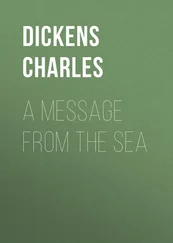Charles Dickens - Pictures from Italy
Здесь есть возможность читать онлайн «Charles Dickens - Pictures from Italy» весь текст электронной книги совершенно бесплатно (целиком полную версию без сокращений). В некоторых случаях можно слушать аудио, скачать через торрент в формате fb2 и присутствует краткое содержание. Жанр: Классическая проза, на английском языке. Описание произведения, (предисловие) а так же отзывы посетителей доступны на портале библиотеки ЛибКат.
- Название:Pictures from Italy
- Автор:
- Жанр:
- Год:неизвестен
- ISBN:нет данных
- Рейтинг книги:5 / 5. Голосов: 1
-
Избранное:Добавить в избранное
- Отзывы:
-
Ваша оценка:
- 100
- 1
- 2
- 3
- 4
- 5
Pictures from Italy: краткое содержание, описание и аннотация
Предлагаем к чтению аннотацию, описание, краткое содержание или предисловие (зависит от того, что написал сам автор книги «Pictures from Italy»). Если вы не нашли необходимую информацию о книге — напишите в комментариях, мы постараемся отыскать её.
Pictures from Italy — читать онлайн бесплатно полную книгу (весь текст) целиком
Ниже представлен текст книги, разбитый по страницам. Система сохранения места последней прочитанной страницы, позволяет с удобством читать онлайн бесплатно книгу «Pictures from Italy», без необходимости каждый раз заново искать на чём Вы остановились. Поставьте закладку, и сможете в любой момент перейти на страницу, на которой закончили чтение.
Интервал:
Закладка:
Or how the country by the Jura mountains, sprinkled with snow, and lighted by the moon, and musical with falling water, was delightful; or how, below the windows of the great hotel of the Three Kings at Bale, the swollen Rhine ran fast and green; or how, at Strasbourg, it was quite as fast but not as green: and was said to be foggy lower down: and, at that late time of the year, was a far less certain means of progress, than the highway road to Paris.
Or how Strasbourg itself, in its magnificent old Gothic Cathedral, and its ancient houses with their peaked roofs and gables, made a little gallery of quaint and interesting views; or how a crowd was gathered inside the cathedral at noon, to see the famous mechanical clock in motion, striking twelve. How, when it struck twelve, a whole army of puppets went through many ingenious evolutions; and, among them, a huge puppet-cock, perched on the top, crowed twelve times, loud and clear. Or how it was wonderful to see this cock at great pains to clap its wings, and strain its throat; but obviously having no connection whatever with its own voice; which was deep within the clock, a long way down.
Or how the road to Paris, was one sea of mud, and thence to the coast, a little better for a hard frost. Or how the cliffs of Dover were a pleasant sight, and England was so wonderfully neat—though dark, and lacking colour on a winter's day, it must be conceded.
Or how, a few days afterwards, it was cool, re-crossing the channel, with ice upon the decks, and snow lying pretty deep in France. Or how the Malle Poste scrambled through the snow, headlong, drawn in the hilly parts by any number of stout horses at a canter; or how there were, outside the Post-office Yard in Paris, before daybreak, extraordinary adventurers in heaps of rags, groping in the snowy streets with little rakes, in search of odds and ends.
Or how, between Paris and Marseilles, the snow being then exceeding deep, a thaw came on, and the mail waded rather than rolled for the next three hundred miles or so; breaking springs on Sunday nights, and putting out its two passengers to warm and refresh themselves pending the repairs, in miserable billiard-rooms, where hairy company, collected about stoves, were playing cards; the cards being very like themselves—extremely limp and dirty.
Or how there was detention at Marseilles from stress of weather; and steamers were advertised to go, which did not go; or how the good Steam-packet Charlemagne at length put out, and met such weather that now she threatened to run into Toulon, and now into Nice, but, the wind moderating, did neither, but ran on into Genoa harbour instead, where the familiar Bells rang sweetly in my ear. Or how there was a travelling party on board, of whom one member was very ill in the cabin next to mine, and being ill was cross, and therefore declined to give up the Dictionary, which he kept under his pillow; thereby obliging his companions to come down to him, constantly, to ask what was the Italian for a lump of sugar—a glass of brandy and water—what's o'clock? and so forth: which he always insisted on looking out, with his own sea-sick eyes, declining to entrust the book to any man alive.
Like GRUMIO, I might have told you, in detail, all this and something more—but to as little purpose—were I not deterred by the remembrance that my business is with Italy. Therefore, like GRUMIO'S story, “it shall die in oblivion.”
CHAPTER IX
TO ROME BY PISA AND SIENA
THERE is nothing in Italy, more beautiful to me, than the coastroad between Genoa and Spezzia. On one side: sometimes far below, sometimes nearly on a level with the road, and often skirted by broken rocks of many shapes: there is the free blue sea, with here and there a picturesque felucca gliding slowly on; on the other side are lofty hills, ravines besprinkled with white cottages, patches of dark olive woods, country churches with their light open towers, and country houses gaily painted. On every bank and knoll by the wayside, the wild cactus and aloe flourish in exuberant profusion; and the gardens of the bright villages along the road, are seen, all blushing in the summer-time with clusters of the Belladonna, and are fragrant in the autumn and winter with golden oranges and lemons.
Some of the villages are inhabited, almost exclusively, by fishermen; and it is pleasant to see their great boats hauled up on the beach, making little patches of shade, where they lie asleep, or where the women and children sit romping and looking out to sea, while they mend their nets upon the shore. There is one town, Camoglia, with its little harbour on the sea, hundreds of feet below the road; where families of mariners live, who, time out of mind, have owned coasting-vessels in that place, and have traded to Spain and elsewhere. Seen from the road above, it is like a tiny model on the margin of the dimpled water, shining in the sun. Descended into, by the winding mule-tracks, it is a perfect miniature of a primitive seafaring town; the saltest, roughest, most piratical little place that ever was seen. Great rusty iron rings and mooring-chains, capstans, and fragments of old masts and spars, choke up the way; hardy rough-weather boats, and seamen's clothing, flutter in the little harbour or are drawn out on the sunny stones to dry; on the parapet of the rude pier, a few amphibious-looking fellows lie asleep, with their legs dangling over the wall, as though earth or water were all one to them, and if they slipped in, they would float away, dozing comfortably among the fishes; the church is bright with trophies of the sea, and votive offerings, in commemoration of escape from storm and shipwreck. The dwellings not immediately abutting on the harbour are approached by blind low archways, and by crooked steps, as if in darkness and in difficulty of access they should be like holds of ships, or inconvenient cabins under water; and everywhere, there is a smell of fish, and sea-weed, and old rope.
The coast-road whence Camoglia is descried so far below, is famous, in the warm season, especially in some parts near Genoa, for fireflies. Walking there on a dark night, I have seen it made one sparkling firmament by these beautiful insects: so that the distant stars were pale against the flash and glitter that spangled every olive wood and hill-side, and pervaded the whole air.
It was not in such a season, however, that we traversed this road on our way to Rome. The middle of January was only just past, and it was very gloomy and dark weather; very wet besides. In crossing the fine pass of Bracco, we encountered such a storm of mist and rain, that we travelled in a cloud the whole way. There might have been no Mediterranean in the world, for anything that we saw of it there, except when a sudden gust of wind, clearing the mist before it, for a moment, showed the agitated sea at a great depth below, lashing the distant rocks, and spouting up its foam furiously. The rain was incessant; every brook and torrent was greatly swollen; and such a deafening leaping, and roaring, and thundering of water, I never heard the like of in my life.
Hence, when we came to Spezzia, we found that the Magra, an unbridged river on the high-road to Pisa, was too high to be safely crossed in the Ferry Boat, and were fain to wait until the afternoon of next day, when it had, in some degree, subsided. Spezzia, however, is a good place to tarry at; by reason, firstly, of its beautiful bay; secondly, of its ghostly Inn; thirdly, of the head-dress of the women, who wear, on one side of their head, a small doll's straw hat, stuck on to the hair; which is certainly the oddest and most roguish head-gear that ever was invented.
The Magra safely crossed in the Ferry Boat—the passage is not by any means agreeable, when the current is swollen and strong—we arrived at Carrara, within a few hours. In good time next morning, we got some ponies, and went out to see the marble quarries.
Читать дальшеИнтервал:
Закладка:
Похожие книги на «Pictures from Italy»
Представляем Вашему вниманию похожие книги на «Pictures from Italy» списком для выбора. Мы отобрали схожую по названию и смыслу литературу в надежде предоставить читателям больше вариантов отыскать новые, интересные, ещё непрочитанные произведения.
Обсуждение, отзывы о книге «Pictures from Italy» и просто собственные мнения читателей. Оставьте ваши комментарии, напишите, что Вы думаете о произведении, его смысле или главных героях. Укажите что конкретно понравилось, а что нет, и почему Вы так считаете.












